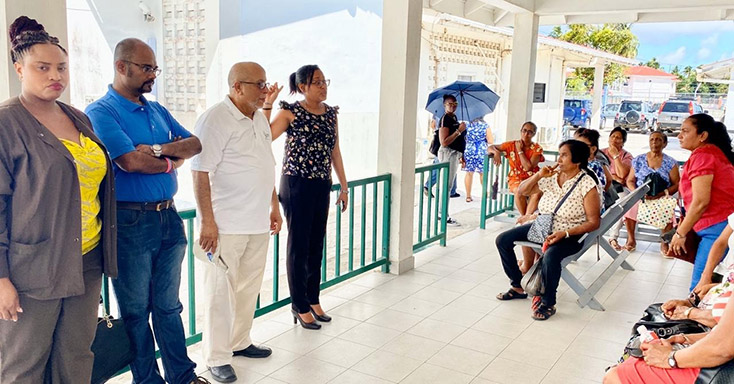A 49-year-old woman, who responded to the Cancer Institute of Guyana’s (CIG) recent two-day cervical cancer campaign in Essequibo, ended up being led to a huge suspicious breast mass through an ultrasound after she took the opportunity to seek advice from the team.
Molly (not her real name) now has to undergo a biopsy and is praying that the results would not be devastating.
She had seen changes in her breast in February but nothing was found when she did a mammogram. Even a doctor she spoke to after told her that the changes she noticed were as a result of menopause.
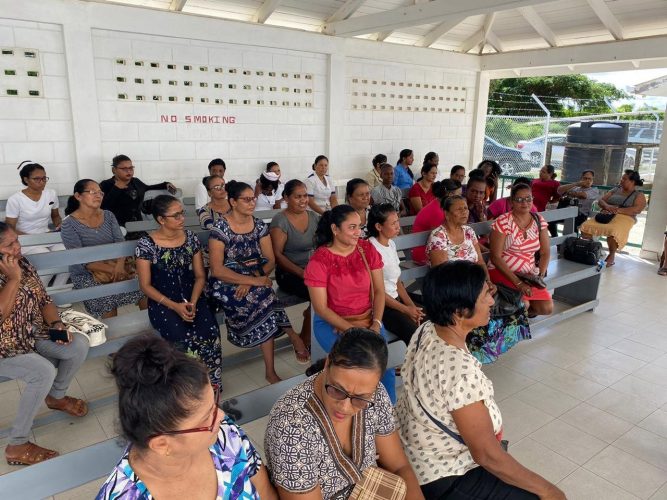
She is nevertheless grateful that she decided to go for the CIG’s cervical cancer screening because she was able to seek the opinion of the doctors there, regarding her breast.
The two-day campaign was held at the Suddie Hospital and the Charity Health Centre.
Director of Outreach, Dr. Syed Ghazi and Oncologist, Dr. Sayan Chakraborty outlined to the women, the purpose and benefits of conducting the Pap smears.
Many of the women who supported the campaign, had lost their loved ones to cervical and other cancers and wanted to know their status while others had seen symptoms and wanted to ensure that they were not cancerous.
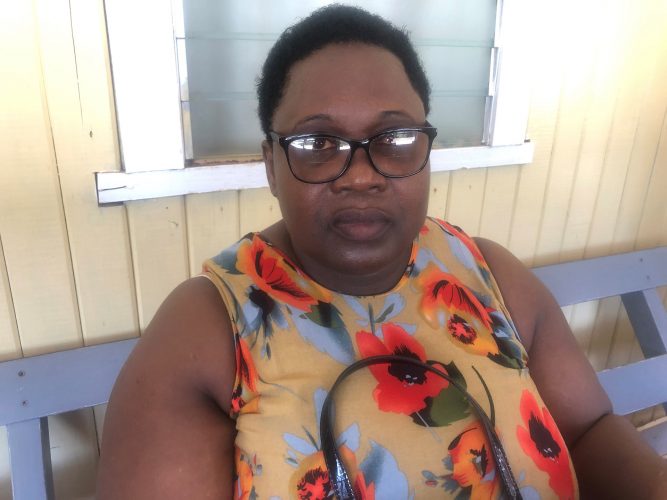
And as much as they were conscious about their health, they could not have the screenings done in Essequibo and did not have the means to travel to Georgetown to have them done.
The CIG conducted the cervical cancer screening campaign through pap smears so that the cancer can be detected and treated at an early stage.
The campaign, which targets low-income women living in remote areas of Guyana, is being funded by the Australian Government’s Direct Aid Program and managed through Healthy Caribbean Coalition’s (HCC) Caribbean Civil Society Cervical Cancer Prevention Initiative (C4PI) – 2019.
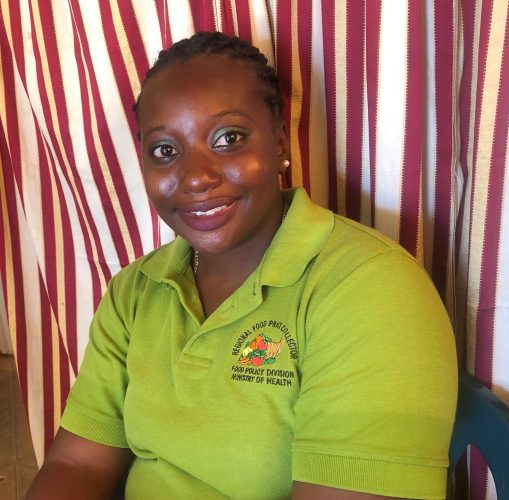
Regional Health Officer, Dr. Afarah Khan facilitated the two-day event and was happy that it was a success.
Dr. Sheneer Reid who coordinated the exercise at the Suddie Hospital, said many of the women from the outlying areas in the region have financial challenges and cannot afford the Pap smears when they are done at private institutions.”
Dr. Reid welcomed the team to conduct the Pap smears there because the hospital does not offer that service.
She said too: “We do offer VIA but we know that Pap smear is the gold standard for diagnosing cervical cancer and for screening pre cancerous lesions. So it is very useful to have an outreach as this in Region Two….”
She said too that “once it is promoted, the women would respond to the free screening and diagnosis and treatment would be done earlier, which would help to reduce the mortality rate of cervical cancer.”
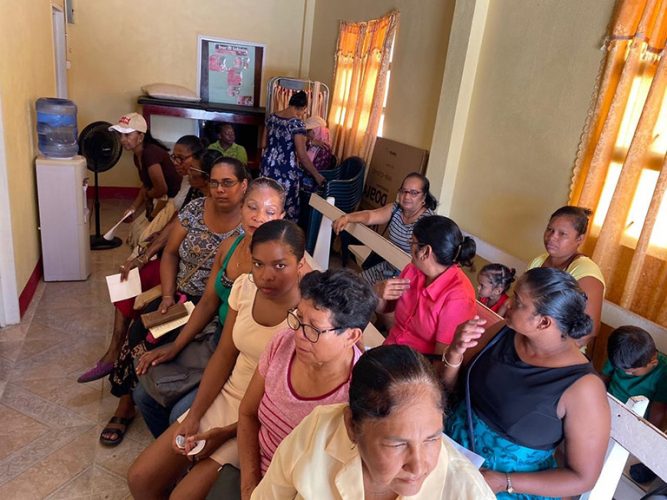
Denial
Molly, who was actually in denial, had done a routine sono-mammogram screening in 2016 during a visit to the US. When the results came her relatives there checked it and told her “the doctors see something” and they wanted her to go in for a discussion.
But by then she had already returned to Guyana. Thinking it was nothing alarming, she ignored that result.
She cannot change what happened but advised other women not to make the same mistake and delay if they notice anything different about their bodies.
Another woman, Lashawn Peters was happy that the team went to Essequibo to conduct the Pap smear test because she saw some suspicious symptoms and was hesitant to travel to Georgetown to have them checked out.
She told this newspaper that she could not bear to deal with bad news after losing her grandmother to cervical cancer two years ago.
In fact, she had become an advocate for cancer screening, encouraging others to get tested if they noticed any signs. But when it happened to her, she was not that brave.
She is praying that the results would come back negative.
“I always tell people that it is very important to get screened early but yet it was hard for me to do it…,” she said.
Now that the test was finally done, she was relieved. She has decided that she would be brave and if the results should come back positive she is prepared to “fight it (cancer).”
The symptoms, including pain and prolonged bleeding, brought back horrible memories of how much grandmother, Waveney Greene suffered because doctors at first missed the cancer.
When her grandmother visited the doctor her sugar level was “very high” and doctors started focusing on that and ignored the other problems.
It was only after Greene traveled to the US that she was diagnosed with stage four cervical cancer.
Peters said that she underwent chemotherapy but “the doctors gave her six months to live… She died one day before the six months were up.”
Shortly after, Greene’s brother, Seebert Belle, 60, was diagnosed with prostate cancer at a late stage. The family was shocked because he looked “healthy and strong.”
She said he apparently had symptoms that would have led to early diagnosis but he ignored them. He died one year later.
Survivor
Another woman, Soomwattie Mangru tearfully said that the reason she came out to get the Pap smear done was because “my sister is a breast cancer survivor.”
She said she wanted to make sure that she does not have cancer or if it shows up she can catch it at an early stage and be treated. She encouraged other women to put their health first and ensure they are screened.
Glenis Evans, 57, had done a Pap smear three years ago and “some positive cells were discovered in the early stages and they froze it. I checked again a year later and it showed negative.”
She was happy that the CIG took the campaign to her area. Last week she was having bleeding issues and “didn’t want to take any chances. I know a woman who had cervical cancer and she suffered a lot before she died.”
Several years ago, Evans lost her four-year-old daughter to leukaemia. She died one year after being diagnosed.
Her mother, who was diabetic died of skin cancer. She developed symptoms such as fever, abscesses and pain and “her skin started to dry up.”
But the doctors were treating her only for the diabetes.
“I don’t even want to remember the hard time she passed through. When they finally did the tests it was too late,” Evans recalled.
For Keertie Singh, she was doing the Pap smear because “it is better to be diagnosed early…”
An emotional Singh told this newspaper that her grandmother was diagnosed with throat cancer and endured a lot pain before she died.
She developed a lump on her throat and it kept growing. She underwent surgery but she never recovered.
According to her, “Cancer is becoming so rapid now, everybody has to take precautions… Cancer is attacking from a tender age. I don’t understand what is happening, it’s very confusing and really heartbreaking to see so many people dying.”
She believes that it could be as a result of too much fertilizers and pesticides. “People spray vegetables and the next day they take it to the market to sell,” she pointed out.
A teacher, Ms. Fraser had done the VIA test back in 2012 and was happy for the opportunity to do the first Pap smear. She was grateful to the CIG team and said “I need to know the state of my cervix early… If something is wrong I can deal with it early.”
A few months ago she lost a relative to cervical cancer because she was diagnosed at a late stage. “When she went to the doctor it was far gone,” she said.
One woman said her cousin told her about the outreach and “without hesitation I came and I told other women to come also.”
She could not afford to go to Georgetown to get it done.
According to another woman, at one time she paid to get the test done at a private institution but they did not get a good reading because they said the fluid was too thick.
Since then she never had another opportunity until the CIG team came.
Cervical cancer is the second leading cause of death among Caribbean women but more than 95 percent of cases can be prevented.
The HCC’s aim is to keep pushing for increased screenings and awareness in order to eliminate this cancer by 2025, the team said.
